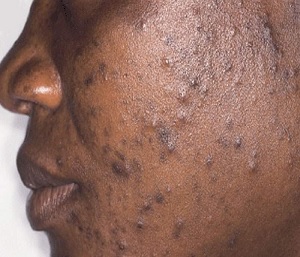Pimples: Cure, Prevention/Control Measures and What you must know about Pimples

A pimple is a small pustule. Pimples develop when the sebaceous(oil) glands, become clogged and infected, which results in swollen, red lesions filled with pus. Pimples are most likely to occur around puberty, but they can happen at any age. During puberty, there are changes in hormone production.
This can cause the oil glands, which are situated at the bottom of hair follicles, to become hyperactive. As a result, pimples are most likely to occur during the teenage-hood and during menstruation, for women.
It’s not a pleasant sight to see Beautifully Endowed Ladies and Handsomely Packed Gents appear with Face-filled Pimples.
It’s not a happy thing and they go at many length to eradicate the mane.
But in all truthfulness, we’re many times, our own problem..
There are certain things we do, use and apply that damages our skin and causes it to malfunction and thus, produce skin diseases.
I’ll be sharing a few. Stay with me.
But hold it to heart that not all of this applies.
Reasons why Pimple appears on your face
People have unique skin texture and structure. Hence, the reactions of Skin may vary.
1] CLOGGING OF SKIN PORES
Pimples occur when skin pores become clogged with sebum and dead skin. Sometimes this leads to infection and inflammation.
The sebaceous glands are tiny skin oil glands that secrete sebum, a waxy or oily substance that lubricates the skin and hair.
Sebaceous glands are found inside the pores of our skin, all over the body, except the palms of the hands and soles of the feet. There are more sebaceous glands on the face and scalp than anywhere else on the body.
As the glands produce sebum inside the pores, new skin cells are produced while the old and existing outer layers of skin are being shed.
Sometimes, dead skin cells are not shed. They stay in the pores and get clogged by the sticky sebum, causing a blockage in the pore.
Pore blockage is more likely to occur during puberty, as the sebaceous glands produce more sebum at this time. Thus, pimples occur.
2] BACTERIAL INFECTION
As sebum and dead skin cells accumulate and block the skin pore, it encourages the growth of undesirable bacteria, including Propionibacterium acnes (P. acnes), a slow-growing bacterium linked to acne.
P.acnes exists on our skin without causing any harm, but over time, it can reproduce more rapidly and cause a problem.
The bacterium feeds off the sebum and produces a substance that causes an immune response. This results in skin inflammation and spots.
Although pimples are related to bacterial infection, they are not communicable..
One person cannot catch pimples from another.
It is uncertain why some people are more prone to pimples than others.
But fluctuations in Hormone and more so, genetic factors may play a role, as acne often runs in families.
3] YEAST INFECTIONS
Pimples and Acne breakouts have a link with yeast infections.
Pityrosporum occurs when a pityrosporum yeast enters the hair follicles and multiplies, this results in an itchy eruption of tiny, rounded pimples, that looks almost like an acne.
Most people have this yeast on their skin, but if it multiplies excessively, it can cause a problem.
Moist and Hot environments, clothes made of synthetic fibers, and the use of oily skin products can worsen this condition.
4] DIETARY FACTORS
The significance of diet in acne is blur, but since a healthy, balanced diet is known to promote good health, some dietary factors may be factors in the likelihood of getting acne or pimples.
Vitamins A, D, and E are significant in maintaining healthy skin, so it is possible that an adequate supply of these vitamins may help prevent acne.
Although acne is related to sebum production, avoiding all fat in the diet is not advisable.
Healthy polyunsaturated and monounsaturated fats are primary for key bodily functions.
A fat-free or very low-fat diet can cause the skin to dry out and prompt the body to increase in the production of sebum
A moderate intake of fats from nuts, seeds, and olive oil may check inflammation and maintain good skin moisture levels so as to provide an effective immune response to prevent bacterial or yeast infection.
